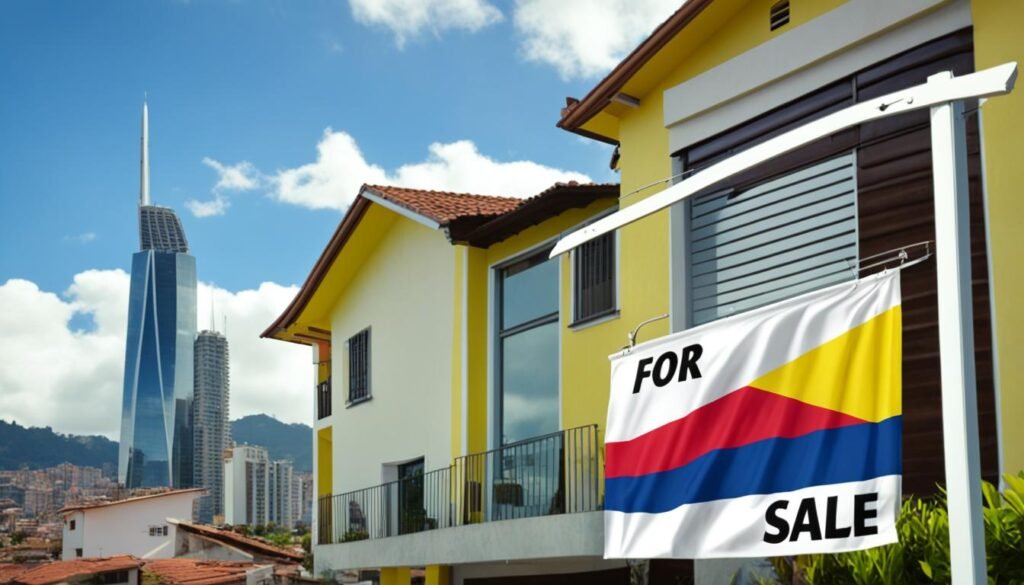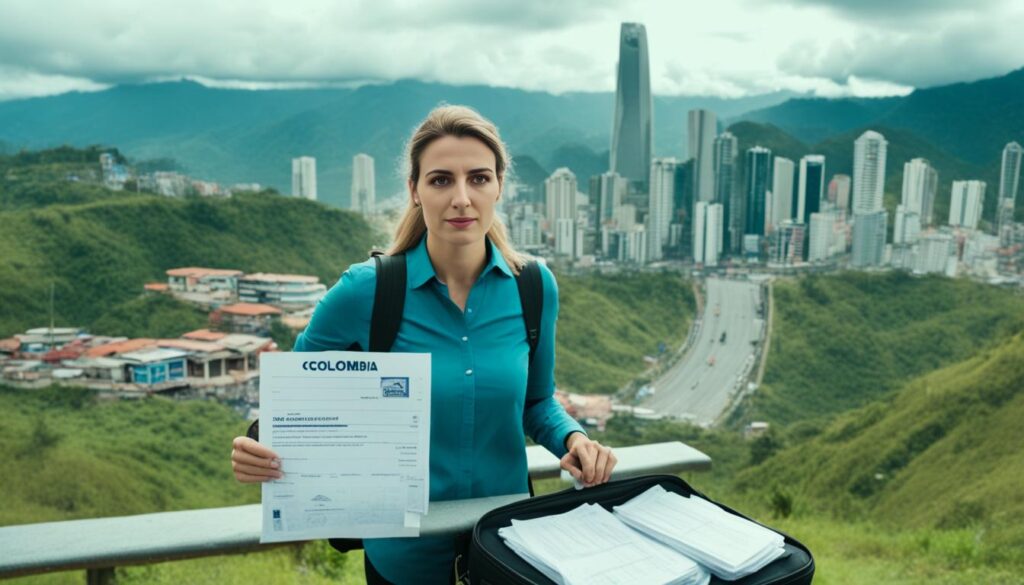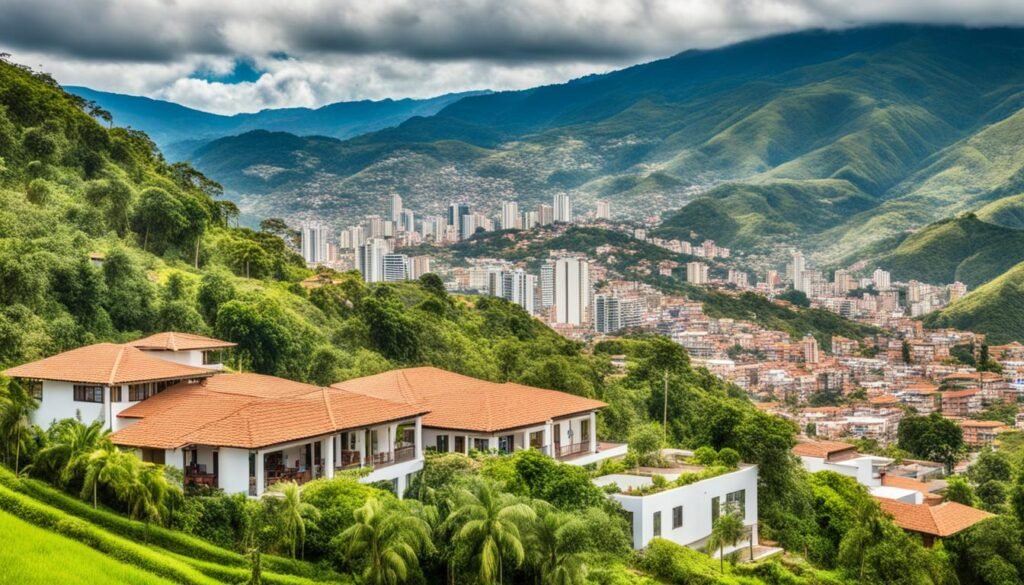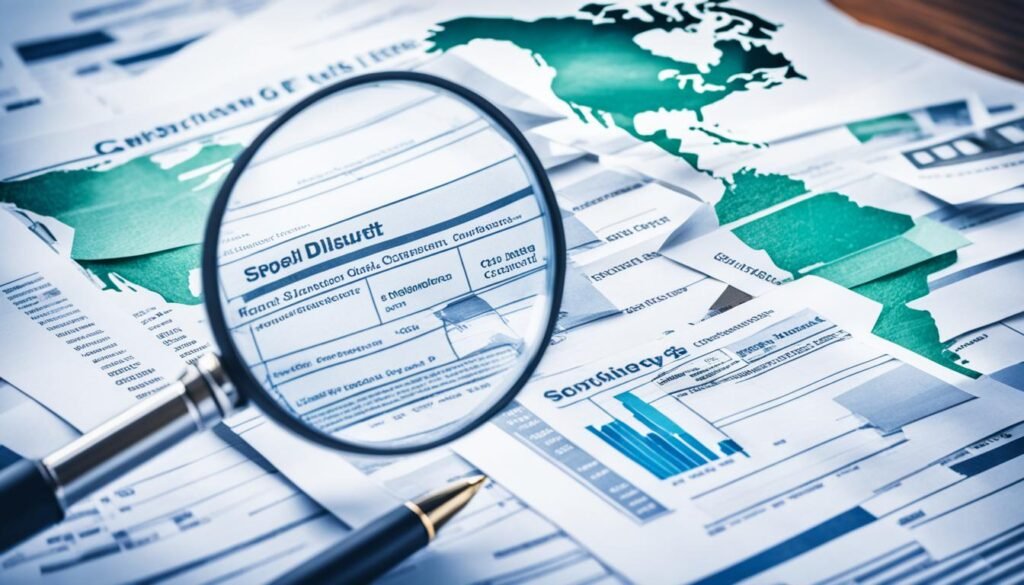Exploring the possibility of investing in Colombian real estate presents an intriguing opportunity for individuals around the globe. Whether it is purchasing property as a foreigner or understanding the real estate laws in Colombia, it is clear that the nation offers a landscape ripe with potential. Advocating for foreign ownership of property in Colombia, the local regulations welcome non-residents by affording them the same privileges to own, enjoy, and even sell their Colombian property as enjoyed by native citizens1.
Property ownership for expats in Colombia is marked by convenience and assurance, with no mandate for residency to initiate a transaction and the possibility of obtaining a property owner’s visa with a substantial investment, bolstering one’s prospects further1. When it comes to buying real estate in Colombia as a non-resident, the country’s ever-growing economy coupled with its diverse geographic offerings emerges as a dynamic backdrop for investing in Colombian real estate.
Key Takeaways
- Foreigners can own Colombian property without restrictions
- Legal rights equivalent to Colombian citizens for property owners
- No mandatory residency for purchasing Colombian real estate
- Investing in property can lead to a visa for property owners
- Colombia provides attractive investment opportunities in diverse locales
- Ongoing economic growth heightens real estate value potential in Colombia
The Attractiveness of Colombia for Foreign Property Investors
Colombia’s strategic positioning as a burgeoning market for property investment cannot be overstated. The nation not only secured the 67th spot out of 190 countries in the World Bank’s 2020 Ease of Doing Business index2, but it also showcased resilience with Foreign Direct Investment (FDI) inflows augmenting by 25.6% from 2018 to 20192. These encouraging figures demonstrate the investment opportunities in Colombian real estate, signaling a business environment that is increasingly amenable to international stakeholders.
Despite experiencing its first economic contraction in more than two decades — 6.8% in 2020 attributed to the impacts of COVID-19 and floundering oil prices2 — Colombia exhibits pertinacity. Its entry into the Organisation for Economic Co-operation and Development (OECD) as the 37th member state in 2020 means adherence to exacting global standards, further elevating its appeal2. Enthusiastic property investors are frequently lured by the benefits of investing in Colombian property, such as the nation’s competitive Gross National Income (GNI) per capita of $6,510 reported in 2019 by the World Bank2.
Colombia’s welcoming approach to foreign capital
is reflected in the proportion of FDI directed to varied sectors: a significant 33% to extractives and a notable 21% to professional services and finance in 20192. Even with the uptick in unemployment to 17.3% by the end of the same year2, the nation’s comprehensive strategies to ameliorate the investment climate remain undeterred.
Remarkably, the U.S. FDI in Colombia in 2019 measured a hefty $8,264 million USD in stock positions, elucidating the country’s attractiveness for foreign property investors from powerhouse economies2. With measures to combat corruption, as evidenced by Colombia’s ranking of 92 out of 180 countries on the Transparency International Corruption Perceptions Index2, investors can proceed with increased confidence.
| Year | FDI Inflows Growth | Major Sectors for FDI | GNI per Capita (USD) |
|---|---|---|---|
| 2018-2019 | +25.6% | Extractives / Services & Finance | 6,5102 |
| 2020 | Economic Contraction: 6.8% | Adherence to OECD Standards | N/A |
Moreover, in the restrictive media sector, foreign investment caps at 40% ownership of national television operators2, a regulation that ensures the industry remains predominantly in Colombian hands while still permitting noteworthy international participation. This selective openness encapsulates the strategic approach of Colombia as it navigates balancing foreign involvement with local interests.
Anchored by a wealth of cultural and regional diversity, from sun-kissed beaches to lush mountain terrains, alongside a cost of living beneficially lower than that in North America and Europe, Colombia is poised to enthrall even more foreign investors seeking a rewarding confluence of lifestyle and opportunity.
Understanding Colombian Real Estate Laws for Foreigners

When considering the venture into the Colombian real estate market, foreign investors must navigate the legal framework for foreign property ownership in Colombia. Knowledge of property rights for foreigners in Colombia is crucial for a successful and lawful transaction. The Colombian legal system offers an inclusive environment where investors from abroad are granted the same property ownership rights as locals, with no discrimination based on nationality or residency.
Equal Rights to Property Ownership
Understanding Colombian real estate laws for foreigners reveals an encouraging scenario: equal opportunity to acquire various types of properties across the nation. This parity in property rights for foreigners in Colombia means that international investors enjoy the freedom to use, enjoy, and dispose of their properties as they would in their home countries. This egalitarian approach encourages a dynamic and attractive investment landscape.
No Special Rules Based on Nationality or Residency
Another advantage for foreigners is that the legal framework for foreign property ownership in Colombia does not impose additional hurdles based on one’s nation of origin or residential status. This ensures a standardized process for both local and international buyers, facilitating a straightforward pathway to ownership for global citizens.
While being an inclusive market for foreign investors, Colombia’s progress in international relations and trade agreements has been noteworthy. For instance, Colombia’s Ministry of Trade and Commerce has engaged in bilateral trade agreements with influential global economies like South Korea, Japan, and China since 20083. Such agreements reflect a business-friendly climate that can significantly benefit foreign real estate investors.
Furthermore, the country’s political stability has seen improvements, particularly with the decrease in FARC’s number of members, now estimated at 5,000–7,0003. In terms of environmental commitment, Colombia has shown its dedication by signing and ratifying 105 international treaties or agreements, including conventions on biodiversity and marine life conservation3. As an active participant on the global platform, Colombia’s role on the U.N. Security Council from 2011 to 2012, where it gained a unanimous vote representing Latin America and the Caribbean, signifies its strengthened international stature3.
| Property Type | Average Size | Average Price |
|---|---|---|
| Apartments | 1,990.05 sq ft | $283,447 |
| Houses | 15,748.53 sq ft | Varies greatly by region |
| Rural Properties | 503.67 sq ft | Varies, often influenced by land size |
| Luxury Property (e.g., in Cali) | Dependent on listing | Up to $3,390,000,000 |
The commitment to legal compliance, security, and international cooperation sets a stage that’s intriguing to foreign investors looking at the Colombian real estate market. With these conditions in play, the country does not just beckon as a hub for cultural and geographical diversity but also as a land of opportunity for those wishing to expand their horizons in international real estate.
Investing in Colombian Real Estate as a Non-Resident

For those considering investing in Colombian real estate as a non-resident, the opportunity is ripe with potential. The country’s welcoming approach to foreign investment is evident as Colombia allows foreigners to own property, including land, without restrictions on the type of property they can purchase1. Understanding the property buying process in Colombia is crucial for a successful investment. Non-residents engage in a buying process that mirrors that of local buyers, with several key steps to ensure a smooth and legally compliant transaction.
Buying Process Similar to Local Buyers
The inclusive nature of Colombia’s legal framework ensures foreigners have the same legal rights as Colombian citizens once they purchase property in the country1. This egalitarian approach fosters a sense of security among investors, contributing to the steady increase in property sales to international buyers1. Residency is not required, making Colombia particularly attractive to vacation home buyers and global investors1.
Vital Role of Title Verification and Legal Compliance
Paramount to the property buying process in Colombia is the importance of title verification in Colombian real estate. Ensuring clear title free from liens or disputes is imperative; it reinforces the integrity of the investment and safeguards the legal rights accorded to the property owner. Legal compliance when buying property in Colombia is not to be overlooked; it is a linchpin in the protection of your investment.
In the pursuit to provide more substantial insights into the investment landscape for non-residents, it is key to note the importance of understanding visa implications when investing. Although no specific visa or permit is required to purchase property, owning property in Colombia can be advantageous for residency purposes and may qualify investors for a Migrant (M) visa with a minimum investment equivalent to 350 times the Colombian minimum wage, or for a Resident (R) visa at a threshold of 650 times the minimum wage1. The R visa, in particular, offers indefinite validity but requires the holder to not remain outside of Colombia for more than two consecutive years1.
Beyond the legal particulars, the allure of Colombia’s real estate market is magnified by the country’s diverse geography, vibrant culture, and favorable government policies aimed at attracting foreign investment1. The blending of modern amenities with Colombia’s natural environs, especially in the luxury housing segments in urban centers such as Medellín, is a distinctive market trait that appeals to a discerning international clientele1.
With the Colombian economy on the rise, bolstered by infrastructure development, and an increasing global recognition as a prime tourist destination, property values are expected to escalate1. These factors become part of a compelling narrative for why investing in Colombian real estate as a non-resident is not just viable but potentially very lucrative.
| Investment Benefit | Description | Visa Eligibility Requirement |
|---|---|---|
| No Restrictions on Property Type | Ability to own various types of properties without limitation1 | No specific visa for purchase |
| Legal Rights Protection | Same property rights as Colombian citizens1 | Property ownership beneficial for residency |
| Non-Resident Friendly | Ideal for investors and vacation home buyers1 | Migrant (M) Visa: Investment ≥ 350 minimum wages1 |
| Increasing Value | Expected rise due to economic growth1 | Resident (R) Visa: Investment ≥ 650 minimum wages1 |
Non-residents have much to gain by exploring the Colombian market, not least the broad access, legal protections, and growing economic backdrop that make this Latin American country a standout option for real estate investment.
Can Foreigners Buy Property in Colombia

Colombia presents an enticing opportunity for foreigners looking to buy property, thanks to its government’s strategy to draw in foreign investment. Vibrant cultures, lush landscapes, and favorable economic conditions are just the tip of the iceberg when it comes to what makes this country so appealing for property ownership for foreigners in Colombia.
Hold a valid passport and ensure you have the necessary funds, and you’ll find that buying real estate in Colombia as a foreigner mirrors the process Columbian residents go through4. This policy reinforces the sense of welcoming and equality that Colombia aims to extend to international investors. For those considering to invest, it’s worth noting that property values in Colombia have been on an upward trend, bolstered by the country’s ongoing economic progress and political stability4.
“Can foreigners buy property in Colombia?” The answer resoundingly echoes, “Yes.” With a real estate market that offers ample appreciation potential and the possibility of obtaining a Colombian residency permit based on investment scale—ranging from one to five years—Colombia positions itself as a hotspot for international property investors4.
Understanding tax responsibilities is crucial when investing in any real estate. In Colombia, total taxes and fees during purchase equate to only 1.65% of the property’s value, making the venture even more viable compared to other Latin American locales where the cost of living might be higher4. Sellers aren’t left out of the financial equation either; they are required to pay taxes and fees ranging between 3.63% and 4.79% of the property’s total value4.
Culminating the purchase process is the signing of the Public Deed, with notable fees including notary costs at 0.25% of the property’s market price4. It is profoundly important for prospective buyers to ensure they follow the legal formalities to secure their investments, and having a guide through the process can be pivotal. A competent resource for the ins and outs of the Colombian property market is buying real estate in Colombia as a foreigner, providing clarity on how to navigate the marketplace successfully.
It is clear that property ownership for foreigners in Colombia has been made accessible and advantageous by the government, whether it’s for personal use or as an investment route that could possibly open doors to longer-term residency4. Considering the economic incentives and the comparative affordability of living costs, Colombia stands out as a strategic choice for foreign real estate investors.
| Investment Benefit | Description |
|---|---|
| Residency Opportunities | Potential for one-year or five-year residency permits based on investment magnitude4 |
| Appreciation of Property Value | Steady growth due to Colombia’s economy and political climate4 |
| Affordable Cost of Living | Attractive for property ownership with lower living costs compared to other Latin American countries4 |
| Favorable Tax Conditions | Low total purchase-related fees at 1.65% of property value4 |
Navigating Visas and Residency Through Property Investment

Colombia, known for its robust growth in the real estate market and its strategic geographic allure, has bolstered its appeal as a prime destination not only for property investment but also for navigating visas and residency1. Investment in Colombian property is not just about securing a tangible asset; it’s about carving a pathway towards residency in a country with rising international stature and a growing economy5. For savvy investors, understanding how to lever property investment into residency options can be a pivotal move.
Opportunities for Migrant (M) and Resident (R) Visas
Accommodative policies make Colombia an enticing proposition for investors seeking to translate property ownership into potential residency. Specifically, investment in real estate opens up doors for the Migrant (M) visa and the Resident (R) visa. With the Migrant (M) visa in the offing, investors can aspire for temporary residency after meeting financial prerequisites, which include investing at least 350 times the Colombian minimum wage—a figure translating to approximately USD 100,000. This visa class also offers prospects of longevity, allowing holders to amass time over 5 years towards the more secure Resident (R) visa, which boasts unlimited validity but has its usage tied to avoiding absences from Colombia spanning over two years1.
Investment Thresholds for Visa Eligibility
The fiscal commitment for escalating from property owner to resident is well defined, with the Resident (R) visa necessitating an investment of at least 650 times the Colombian minimum wage, rounding off near USD 185,000. While investment figures can shift with economic tides, they hinge on the current minimum wage in Colombia, thus necessitating constant engagement with up-to-date legal advice to stay abreast of investment thresholds for visa eligibility15. With Colombia’s evolving infrastructural landscape and its increasing cachet as a global tourist locale, these investment considerations are not only a gateway to residency but also a potential precursor to amplified property valuation1.
With such bright prospects anchored by a growing economy, an expanding real estate market projected to hit USD 2.12 trillion by 2024, and cities like Medellín and Bogotá becoming beacons for expats5, Colombia is definitively marking its territory as a desirable hub for foreign investment. The blend of modern living in harmony with nature, available across various property types from beachfront vistas to urban havens, Colombia indeed paints a compelling picture for those exploring opportunities for visas through property investment in the region1.
Financing and Managing Your Colombian Real Estate Investment
Delving into the world of Colombian real estate provides a wealth of opportunities, but it also presents certain financial challenges and administrative tasks that are crucial for a smooth investment journey. Understanding the intricacies of financing and managing Colombian real estate investment is fundamental to achieving success in this vibrant market.
Challenges in Obtaining Mortgages for Foreign Buyers
Securing a mortgage as a foreigner in Colombia involves navigating a complex financial landscape. One must be prepared to counter the challenges in obtaining mortgages for foreign buyers in Colombia through diligence and strategic financial planning. Colombian banks typically require foreign investors to furnish a substantial down payment—often 30% to 40% of the property’s value—alongside obtaining a Colombian Tax ID (RUT) essential for property registration and tax purposes6. Such stringent measures underscore the importance of exploring alternative avenues like seller financing, private loans, or pursuing home country financing options such as a Home Equity Line of Credit6.
Money Transfer and Currency Exchange Considerations
When buying property in Colombia, investors must navigate the dynamics of money transfer considerations for buying property in Colombia. The fluctuation in currency exchange rates can significantly impact the final cost of investment when funds are transferred internationally. Aligning with a broker or financial institution specializing in international transfers can provide the advantage of competitive rates and lower transaction fees. The management of a Colombian real estate investment extends to opening a local bank account and staying compliant with the country’s tax regulations6.
| Consideration | Detail | Implication for Foreign Investor |
|---|---|---|
| Mortgage Availability | Restricted options without visas6 | May need alternative financing plans |
| Down Payment | Ranges from 30% to 40% of property value for foreigners6 | Larger initial capital outlay required |
| Property Registration | Must obtain a Certificate of Tradition and Liberty6 | Ensures legal ownership and transparency |
| Real Estate Agent Commission | Typically 3%, paid by the seller6; Buyer’s and seller’s agents split equally7 | Cost consideration for selling property |
| Rental Yield | Average return of at least 12%7 | Potential income from investment |
| Appreciation Rate | Average annual appreciation around 10%7 | Capital gains potential |
| Legal Representation | Advised to hire a bilingual attorney6 | Facilitates communication and legal compliance |
| Taxes and Fees upon Sale | Between 3.63% and 4.79% of the property value7 | Additional cost when liquidating investment |
Investing in Colombia’s prime cities like Medellín, Bogotá, Cartagena, and Cali can offer unique opportunities, marked by high rental yields and property appreciation rates. This underlines the importance of a well-informed investment strategy that takes into account both the challenges and advantages of financing and managing Colombian real estate investment67.
Real Estate Market Dynamics and Regional Opportunities

As we dive into the compelling landscape of Colombian real estate, it’s clear that the dynamics at play are as varied as the country’s famed topography. The recent surge in foreign direct investment which peaked at $3.9 billion in December 2022, underscores international confidence in Colombia’s economic growth and, by extension, its real estate potential8. Furthermore, the tripling of investments in technology and innovation positions Colombia as a leader in Latin America, inviting a new breed of savvy investors to its shores8.
Diversity in Colombian Geography and Property Types
The diversity in Colombian geography and property types cannot be overstated, ranging from the lush greenery of the Amazon to the crystal-clear shores of the Caribbean. This geographical richness allows for an abundant array of property options, from urban high-rises in booming metropolitan areas to tranquil coffee plantation estates nestled in the countryside. More than just a picturesque backdrop, Colombia’s diverse landscape offers tangible benefits to the real estate market as it meets the varied needs and desires of global property seekers.
High Demand Areas: Medellín, Cartagena, and Santa Marta
In the context of high demand areas for real estate in Colombia, cities like Medellín, Cartagena, and Santa Marta are not just tourist hotspots but also epicenters of economic activity and cultural exchange. Highlighting the interconnected nature of commerce and real estate, Colombia’s non-mining exports hit $21.6 billion in 2022, with a notable 19% increase from the previous year8. This, coupled with a 27% growth in exports to the United States, demonstrates the robust external demand for Colombian products and the advantageous position of the nation in the global market—factors that invariably kindle the interest of property investors8.
Linking back to the regional opportunities in Colombian real estate, the expansion of Colombia’s economy by 8% in 2022 shows not only a rebound from the pandemic but also a promising future for investment in property8. A population of 52.1 million and growing signifies a burgeoning domestic market, with increasing urbanization driving the demand for real estate in cities and beyond. As a confluence of cultural vibrancy and economic tenacity, these high-demand regions reflect the dynamic interplay between Colombia’s heritage and its modern-day aspirations.
Astutely perceiving these trends, investors will note that although the central bank’s interest rate has climbed to 13%, indicating some fiscal tightening, the country’s free trade agreements with over 65 nations hint at a manifold increase in logistical and business operations that could propel the real estate market even further8. The very essence of the real estate market dynamics in Colombia lies in understanding these complex economic movements and leveraging them to one’s advantage.
For the discerning investor, comprehending the intricate weave of regional opportunities in Colombian real estate is pivotal. And with elite addresses like Medellín’s El Poblado, Cartagena’s historic Old City, or the burgeoning tourism hub of Santa Marta, one can envision the stride of progress these hotspots are taking – attracting expatriates, entrepreneurs, and visionaries who seek to be part of Colombia’s bright and unfolding story.
The Importance of Due Diligence in International Property Purchases

When venturing into the international real estate market, particularly in Colombia, a thorough understanding of due diligence cannot be overstated. The steps taken in this preparatory phase can serve as a safeguard against future legal entanglements and financial setbacks. Committing to the importance of due diligence in international property purchases allows investors to approach transactions with an informed perspective and fortified security.
Prospective property buyers in Colombia, especially those hailing from countries like the United States, whose exports and business practices heavily influence Colombian markets, must be mindful that their investments are subject to unique challenges9. Geographic proximity and an affinity toward American products offer US investors a competitive edge, yet they also face unfair business practices including contraband and counterfeiting9. Navigating these complexities requires more than just a cursory evaluation of assets.
Conducting a Comprehensive Due Diligence Report
To mitigate these risks, conducting a comprehensive due diligence report is paramount. This involves deep scrutiny into the property’s legal standing, verifying that no lien, dispute, or claim could compromise the asset’s integrity. In Colombia, such vigilance pays dividends, as factors like quality, profitability, financing, and after-sales service sway purchasing decisions significantly9. Therefore, a well-curated due diligence report will highlight these facets, demonstrating the asset’s capacity to meet these criteria.
Addressing Potential Complications in Title History
Critical to the due diligence process is addressing potential complications in title history when buying property in Colombia. A property’s title history can unveil a myriad of potential barriers ranging from unresolved ownership claims to restrictions that can impair its value9. Direct dealings with manufacturers, which Colombians traditionally prefer for pricing and guarantees, emphasize the need for absolute clarity in ownership chains and titles9.
In conclusion, the astute investor recognizes that the due diligence process is an indispensable component of a sound international property transaction. A robust understanding of its importance, including the necessity to delve into the property’s history and the creation of a comprehensive report, can be the deciding factor between a prosperous investment and a regrettable oversight. It’s a strategic move that aligns with the intricate requirements of buying property offshore and specifically addresses the intricate market dynamics of Colombian real estate.
Conclusion
As we’ve explored the dynamic possibilities of investing in Colombian real estate, it’s evident that such endeavors hold appealing benefits for international investors. The partnership between the United States and Colombia is a testament to the robust economic exchange, with Colombia being a key trade and investment partner, highlighting the country’s strong economic ties and growing international relevance10. This, combined with Colombia’s welcoming approach towards foreign property ownership, presents a promising summary of foreign property ownership in Colombia.
Backed by comprehensive legal frameworks, foreigners enjoy equal property rights as Colombian citizens, fostering a secure investment environment10. The blossoming relationship, further proven by the more than 450 US businesses investing in Colombia, specifically in the mining and manufacturing sectors10, indicates a stable economic landscape ripe for real estate investment. With the Colombian government’s robust initiatives and the support of over $1.5 billion in assistance to reinforce peace, human rights, and the rule of law10, investors can contribute to and benefit from the country’s progressive trajectory.
In conclusion, for those considering the acquisition of property in Colombia, the journey extends beyond simply owning a piece of land; it’s an invitation to be part of Colombia’s vibrant economic and social fabric. A thorough approach to due diligence and adherence to local laws will pave the way for a fruitful investment, clearly elucidating the enduring allure of the Colombian real estate market for foreign investors.
FAQ
Can foreigners buy real estate in Colombia?
Yes, foreigners can buy real estate in Colombia, including land. There are no restrictions on the type of property a foreigner can own.
Do foreigners have the same legal rights as Colombian citizens when purchasing property in Colombia?
Yes, once foreigners purchase property in Colombia, they have the same legal rights as Colombian citizens.
Is residency required to buy property in Colombia?
No, residency is not required to buy property in Colombia. However, owning property can qualify foreigners for a Colombian investment visa.
What should foreigners consider when buying property in Colombia?
It’s important for foreigners to follow the correct legal processes, work with a reputable real estate agent and a lawyer familiar with Colombian property law, and conduct due diligence to ensure a smooth purchase.
Why is Colombia an attractive destination for foreign property investors?
Colombia offers breathtaking landscapes, a vibrant culture, and welcoming people. It has a growing economy, improving security situation, and favorable government policies that make it easier for foreigners to invest in real estate. The cost of living and property prices in Colombia are also relatively low compared to North American and European standards.
Do foreigners have equal rights to property ownership as Colombian citizens in Colombia?
Yes, foreigners have equal rights to property ownership as Colombian citizens in Colombia. There are no special rules based on nationality or residency.
Can foreigners invest in Colombian real estate as non-residents?
Yes, non-residents can invest in Colombian real estate. The buying process is similar to that of local buyers.
What role does title verification and legal compliance play in buying property in Colombia as a foreigner?
Title verification is vital to ensure the property has a clear title and is free from liens or legal disputes. Legal compliance during the purchase process protects the buyer’s rights and avoids future complications.
Is there a specific visa or permit required for foreigners to buy property in Colombia?
No, there is no specific visa or permit required for foreigners to buy property in Colombia. However, owning property in Colombia can be beneficial for those seeking to apply for residency or a property owner’s visa.
Can foreigners obtain mortgages for buying property in Colombia?
Foreigners may face challenges in obtaining mortgages in Colombia. It’s important to be prepared to make a significant down payment and possibly pay higher interest rates if a mortgage is obtained.
What are some high demand areas for real estate in Colombia?
Medellín, Cartagena, and Santa Marta are high demand areas in Colombia that attract both domestic and international buyers.
Why is due diligence important when buying property in Colombia as a foreigner?
Due diligence is crucial to verify that the property has a clear title and is free from any potential complications, such as liens or legal disputes. This helps avoid future complications and protects the buyer’s investment.
Can foreigners make a successful real estate investment in Colombia?
Yes, foreigners can make a successful real estate investment in Colombia by navigating the legal framework, following the correct procedures, conducting due diligence, and working with professionals familiar with Colombian real estate laws.
Source Links
- https://thelatinvestor.com/blogs/news/colombia-real-estate-foreigner
- https://www.state.gov/reports/2021-investment-climate-statements/colombia#!
- https://en.wikipedia.org/wiki/Foreign_relations_of_Colombia
- https://www.bizlatinhub.com/how-to-buy-property-in-colombia/
- https://expatmoney.com/blog/colombias-open-doors-exploring-real-estate-opportunities-for-expats
- https://www.colombianvisaservices.com/blog/buying-property-in-colombia
- https://financialgoodness.com/everyone-can-buy-and-own-property-in-colombia/
- https://www.nasdaq.com/articles/7-reasons-why-investors-should-be-looking-for-opportunities-in-colombia
- https://www.trade.gov/country-commercial-guides/colombia-selling-factors-and-techniques
- https://www.state.gov/u-s-relations-with-colombia/
Comments